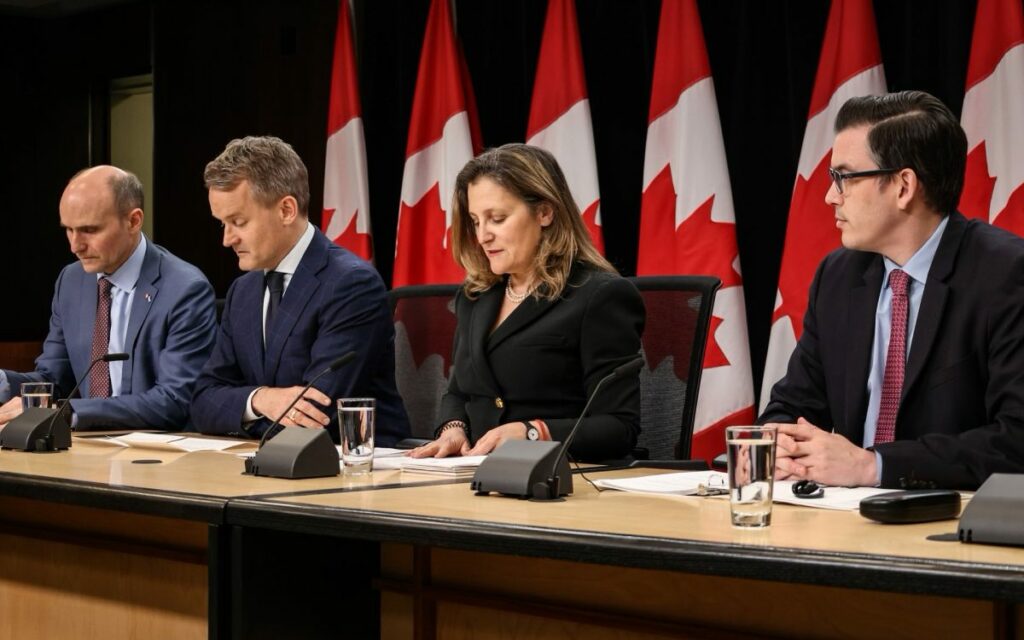
The Liberals are calculating that the Tories will oppose the capital gains increase and play into the narrative that the Conservatives are the party of the rich. Pictured: Finance Minister Chrystia Freeland. Photo Credit: Chrystia Freeland/X.
Last week, the federal government introduced legislation that would advance their plans outlined in the budget. Broadly, the legislation matched up to what the Liberals touted last month – a plan with lots of spending. However, one thing missing was the changes to capital gains, which, in theory, would help bankroll the government’s $52.9 billion of new spending.
The decision to leave out this key change in tax policy was not an error or incompetence, but instead a carefully calculated political move by the Deputy Prime Minister and Finance Minister, Chrystia Freeland. Not only is the change to capital gains a pet project and a change Freeland personally believes in, but it is also a potential political hot potato.
Since the last election, the word “affordability” has been said in the House of Commons over 2,400 times and produces over 20 pages of Google news stories in the last week. And rightfully so, as many Canadians are struggling to pay their bills on time, keep a roof over their heads, and their fridge light on.
This may sound like it was taken word for word from a speech by Pierre Poilievre, Leader of the Conservative Party, but it is the hard reality that many Canadians find themselves in. To the credit of Poilievre, he has successfully tapped into this feeling that life is harder and pins the blame squarely on the government. If the polls are to be believed, this will be a winning strategy for Tories, and this is where the challenge of capital gains comes into play.
A recent survey from Abacus Data found that the Conservatives have a 21-point lead over the government, and their recent budget, which many party insiders thought would create movement, has fallen flat. The silver lining for the government is that of the two things Canadians remember most about the budget, the focus on housing and changes to capital gains.
Rarely would a mundane and fairly technical tax change be memorable, but it is 2024, so anything is possible. For the government, their hope is not only to make some extra cash with this policy change but also to be able to say that they are making life more affordable for the average Canadian.
The changes to housing policy will take years, even decades, to be felt. Rome was not built in a day, and Canada’s housing crisis will not be solved in a day; whereas changing the tax rates for high-income earners will be seen and felt instantly. The government can be seen taking action to support the middle-class Canadians, developing programs to make life affordable again and ensuring that all Canadians pay their fair share.
Though there is some debate on who the middle class is, and if those earning over $250,000, the new threshold for the changes to capital gains, are part of the middle class. Statistics Canada’s most recent data shows that the average Canadian household earns $73,000 a year after taxes. Meaning that those who are claiming this change will harm the average Canadian are a bit off, since even doubling their income still falls short of the changes.
By leaving out these changes to the tax code in the budget bill, the government will likely introduce legislation that is specific to changing the rules around capital gains. Which will force the Conservatives, who have been fairly quiet on their stance around the changes, to weigh in. The Liberals are calculating that the Tories will oppose the increase and play into the narrative that the Conservatives are the party of the rich and do not care about the average person struggling.
If successful, not only will the Liberals be able to show Canadians that they are taking the nation’s affordability crisis seriously, but they may also be able to get some leverage on the Tories and gain a few points in the polls. It would be a win-win-win for the Grits and a major headache for the Tories.
There are gains to be made with the capital being spent, but will it be worth it? Only time will tell.

Daniel Perry is a Senior Consultant with Hill & Knowlton, Canada’s leading public relations and public affairs firm. He is an experienced campaigner and has provided political advice at all levels of government. Daniel has received a number of awards during his career including being voted Ottawa’s top consultant by his peers.




















